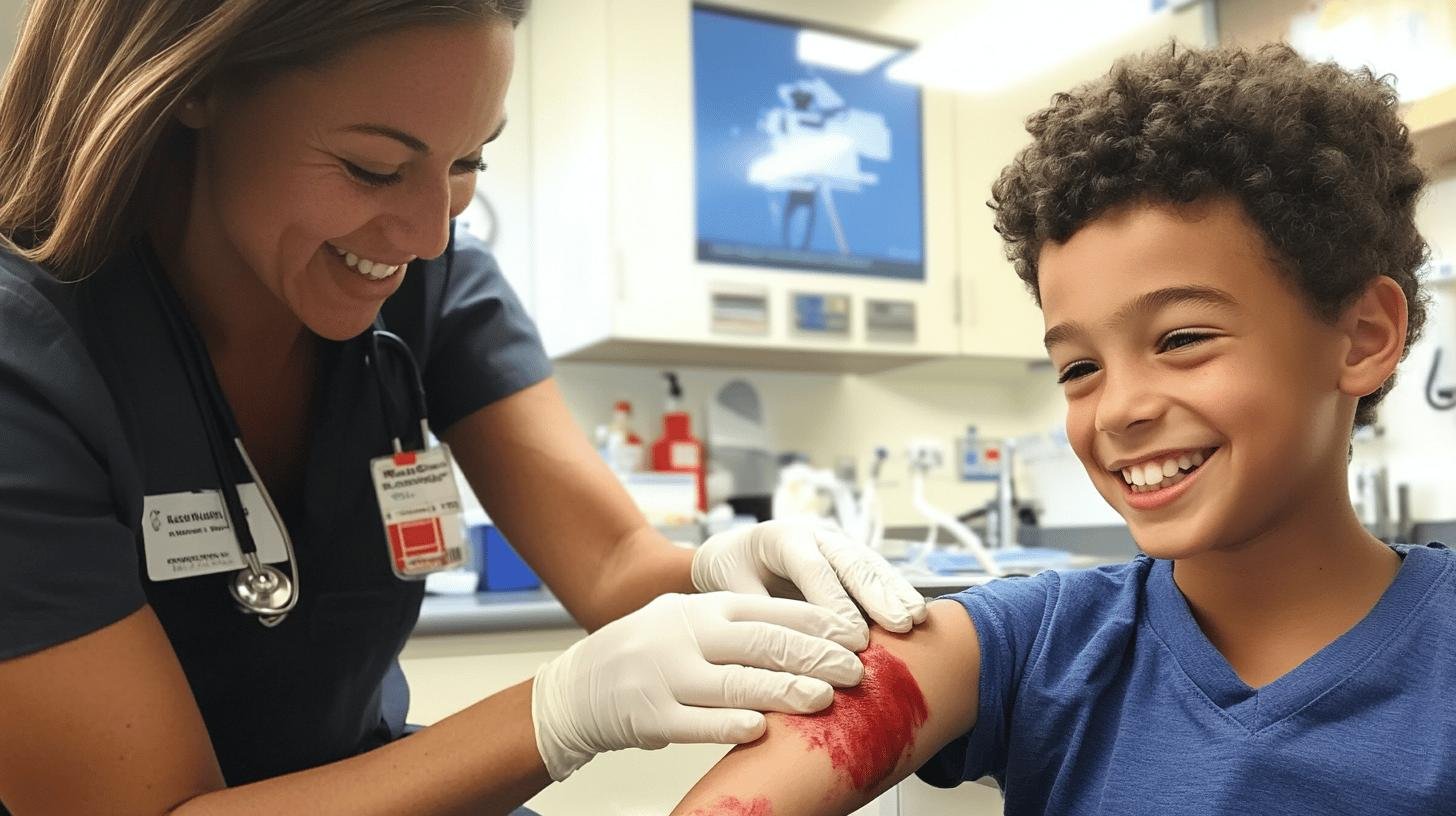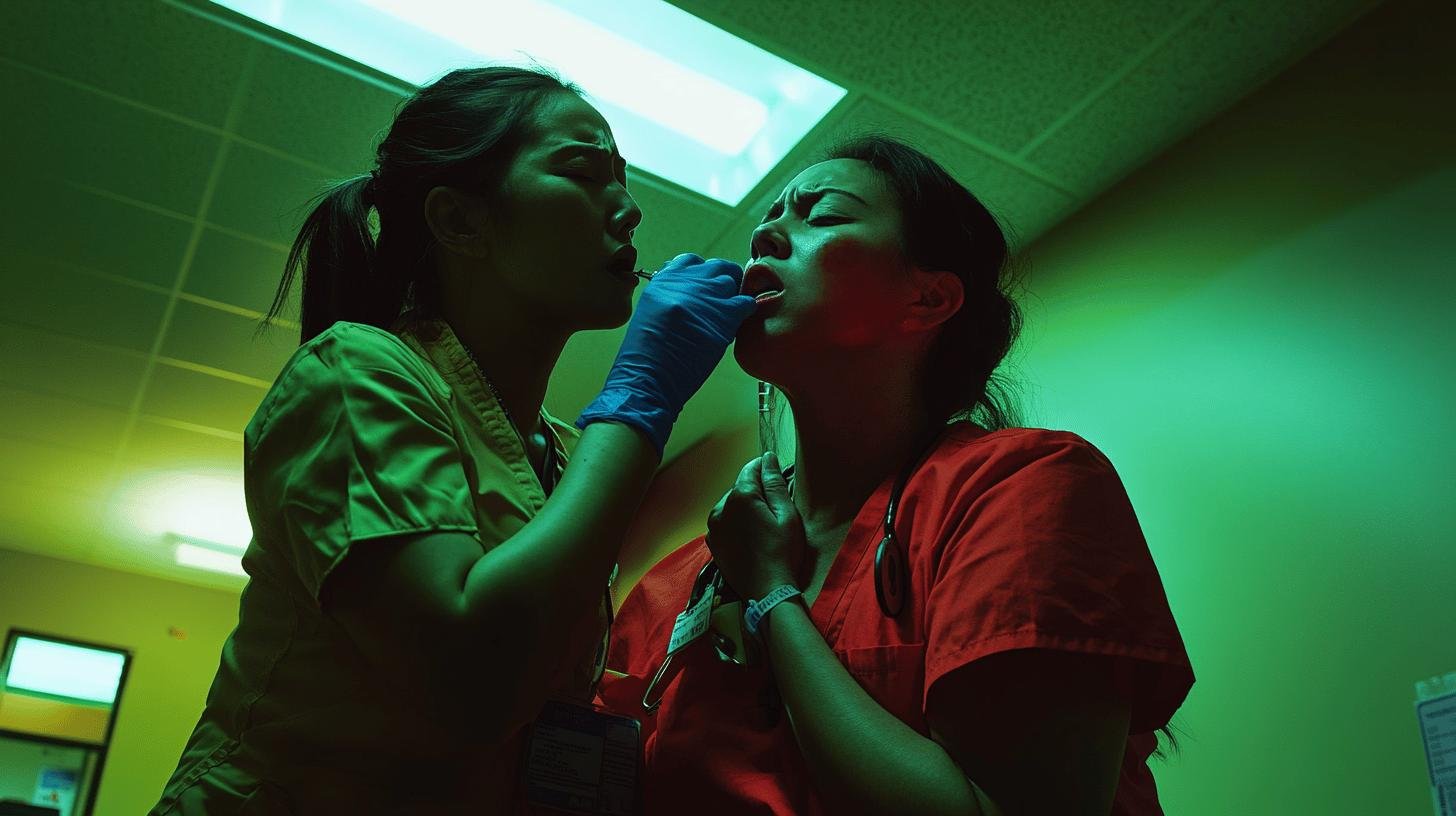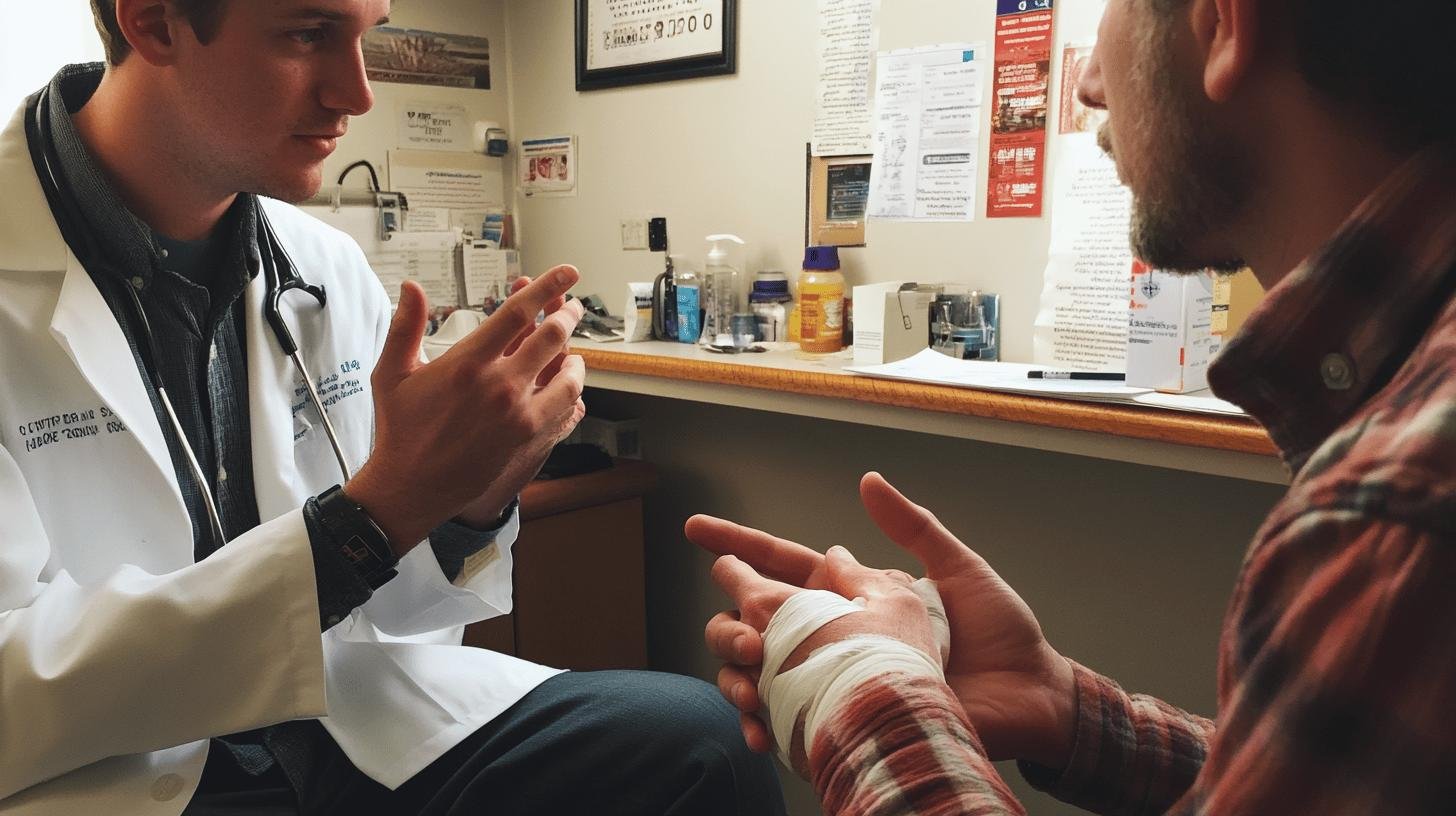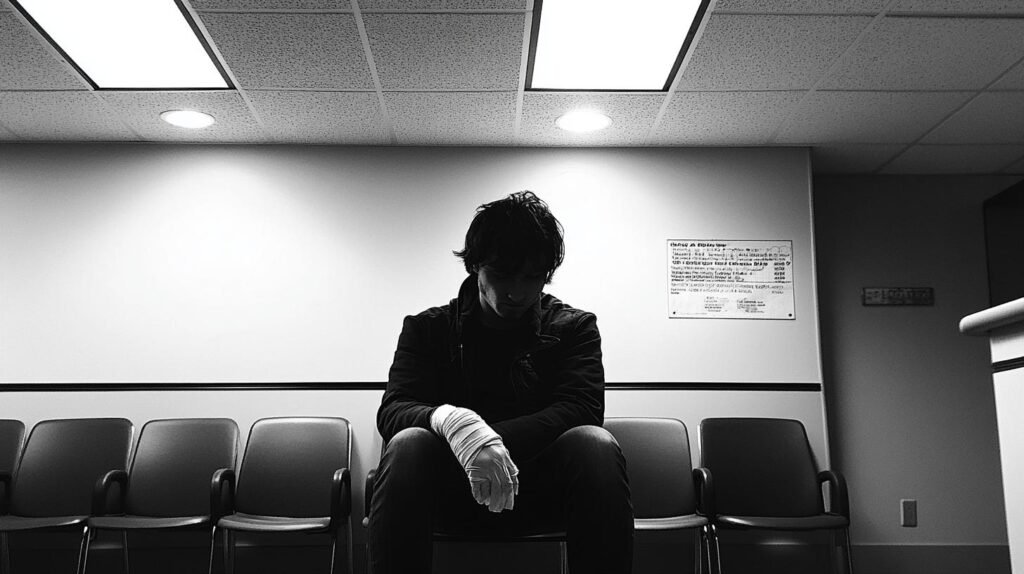TL;DR:
- Common Urgent Care Reasons: Upper respiratory infections, sprains, sore throats, urinary tract infections, eye infections, digestive issues, minor injuries.
- Injury Treatments: Sprains treated with joint support; cuts cleaned and stitched; minor burns dressed; minor fractures stabilized.
- Urgent vs. ER: Use urgent care for non-life-threatening issues (e.g., minor burns, rashes) and ER for severe conditions (e.g., chest pain).
- Symptoms Treated: Flu, eye discomfort, breathing difficulties, nausea, rashes, ear pain.
- Advantages of Urgent Care: It is lower cost than the ER, has shorter wait times, accepts major insurances, and offers self-pay options.
- Specific Scenarios: Animal bites cleaned/vaccinated; sports injuries diagnosed; vomiting/diarrhea managed for dehydration.
Ever had that nagging feeling something might be wrong but thought, “I’ll just wait it out”? Well, sometimes waiting isn’t the best move, especially when it comes to your health. In this article, we’ll dive into eight reasons you should beeline for urgent care. From surprising sprains to those pesky sore throats, learn why some health issues need immediate attention. Stick around, and you’ll get the lowdown on when to hit up your local urgent care so you can feel better, faster. Let’s get into it!
Common Reasons to Visit Urgent Care
Upper respiratory infections and viruses, such as colds, COVID-19, flu, mononucleosis, and sinus infections, drive many people to urgent care. These illnesses cause coughing, sneezing, sore throat, and fever. Urgent Care (UC) can help you feel better fast without a long wait.
Sprains, strains, and sore throats also bring people into urgent care. Twisting an ankle, hurting a wrist, or a knee sprain can be painful and restrict movement. Sore throats can be annoying and sometimes indicate something serious like strep throat. Quick treatments by UC can prevent further issues and get you back on your feet.
- Upper respiratory infections
- Sprains and strains
- Sore throats
- Urinary tract infections
- Eye infections
- Digestive issues
- Minor injuries
Digestive issues like vomiting, diarrhea, and stomach pain can hit hard. Food poisoning, stomach flu, gallbladder problems, and even appendicitis can be the cause. Eye infections, such as pink eye, need prompt treatment to prevent spreading and worsening. UTIs, especially common in women, need attention before becoming bigger problems. Whenever you’re feeling off, urgent care can handle these common but pesky issues, they are your go-to for quick relief and proper diagnosis.
Urgent Care for Minor Injuries

Minor injuries like sprains, cuts, and burns can happen to anyone at any time. Twisting an ankle while jogging, slicing a finger while cooking, or getting a minor burn from a hot pan are all too common. These injuries need prompt attention to ensure they heal properly and don’t escalate into bigger issues.
Urgent Care is equipped to handle these minor injuries efficiently. If you’ve got a sprain or strain, they can diagnose the injury and offer anti-inflammatories or joint support for a speedy recovery. For cuts needing stitches but aren’t gushing blood, they can clean the wound, bandage it, and stitch it up to minimize infection and scarring. Got a minor burn from a household accident? No problem. they will clean it, dress it, and manage the pain to prevent complications.
| Injury Type | Treatment |
|————————-|——————————————|
| Sprains and strains | Diagnosis, anti-inflammatories, joint support |
| Cuts needing stitches | Cleaning, bandaging, stitches |
| Minor burns | Cleaning, dressing, pain management |
| Minor fractures | Stabilization, pain management |
Using Urgent Care for these minor injuries has clear benefits. You get quick, professional treatment without long ER wait times and it’s usually more cost-effective. Next time you have a minor injury, skip the ER and head to UC for fast, efficient care.
When to Choose Urgent Care vs. Emergency Room
Urgent care (UC) is ideal for non-life-threatening conditions needing prompt attention. It’s the middle ground when your primary care doctor is booked and it’s not serious enough for the ER. Got a minor burn, rash, mild asthma attack, or a minor allergic reaction? UC can handle these efficiently, saving you time and money compared to an ER visit.
The ER is a must for life-threatening issues like chest pain, severe bleeding, or major trauma. These situations need immediate, high-level care that only an ER can provide. If you’re experiencing any of these severe symptoms, heading straight to the ER is crucial.
- Major burns
- Rashes
- Mild asthma attacks
- Minor allergic reactions
- Severe chest pain (ER)
Choosing the right place for your medical needs makes a huge difference in your care and recovery. UC centers have shorter wait times and are more cost-effective for minor ailments. But for life-threatening conditions, don’t hesitate—go to the ER for the care you need.
Symptoms and Conditions Treated at Urgent Care

Common symptoms treated at Urgent Care include flu symptoms, colds, sore throats, ear infections, and urinary tract infections (UTIs). When you’re battling persistent coughs, sneezes, sore throats, or fever, UC can get you back on track without the hassle of long ER waits. Ear infections, common in children, and UTIs, frequent in women, are other reasons to visit UC for quick and effective treatment.
Persistent eye discomfort like blurred vision, discharge, itchiness, teariness, or redness shouldn’t be ignored. Conditions like pink eye need prompt attention to prevent spreading and worsening. UC can provide the necessary medications. Moderate breathing difficulties, whether from respiratory infections, allergies, or asthma, are also handled well at UC. They can help manage your symptoms and get you breathing easy again.
- Flu symptoms
- Persistent eye discomfort
- Moderate breathing difficulties
- Nausea and digestive issues
- Rashes or itchiness
- Ear pain or discomfort
Digestive issues like nausea, bloating, vomiting, and diarrhea can be disruptive. Causes range from food poisoning and stomach flu to more severe conditions like appendicitis. UC can diagnose and treat these symptoms, providing relief and preventing complications. Rashes or itchiness from allergic reactions to pollutants, plants, bug bites, or foods are treatable at urgent care with fast-acting medication. Lastly, ear pain or discomfort caused by infections or injuries can be quickly managed at UC with antibiotic ear drops to ease your pain and clear the infection.
Cost and Convenience of Urgent Care
UC centers are often much more affordable than the ER, especially for minor issues. They are a real lifesaver if you don’t have health insurance or are underinsured. The cost of a visit is a fraction of what you’d pay at an ER. Plus, many UC centers accept most major insurances and offer self-pay options for those without coverage.
Convenience is another big win for UC. Wait times are usually much shorter than in emergency rooms. You can get in and out quickly, which is perfect when you’ve got a busy schedule or just want to get back to feeling better fast.
- Lower cost compared to ER
- Shorter wait times
- Accepts major insurances
- Self-pay options
Specific Scenarios for Urgent Care Visits

Got bitten by an animal? Don’t just brush it off! Head to a UC center to get that bite cleaned and vaccinated. Animal bites can introduce harmful bacteria into your body, and a quick visit to UC minimizes infection risk and ensures you get the necessary shots.
Sports injuries like sprains, strains, and minor fractures are another reason to visit UC. Whether you twisted your ankle playing basketball or strained your wrist lifting weights, UC can diagnose your injury and provide the necessary support. Dizziness might seem minor, but various conditions can cause it. UC can diagnose the cause and get you the treatment you need to steady yourself.
| Scenario | Treatment |
|———————–|————————————|
| Animal bites | Cleaning, vaccination |
| Sports injuries | Diagnosis, medical support |
| Dizziness | Diagnosis, treatment |
| Vomiting | Hydration, medications |
| Diarrhea | Hydration, medications |
If you’re dealing with vomiting or diarrhea, UC is your ally. These symptoms can signal food poisoning or stomach flu and can cause serious dehydration. UC can manage these issues with proper hydration and medications, getting you back on your feet faster. UTIs, more common in women, often don’t resolve on their own and need prompt treatment to avoid complications.
Final Words
From tackling nasty respiratory infections to managing sprains and strains, UC centers cover a lot of ground.
We dove into common urgent care reasons, minor injuries, and when to choose UC vs. the ER.
Remember, for non-life-threatening issues, UC is your go-to.
With shorter wait times and cost savings, it’s a no-brainer.
Feel confident knowing urgent care can handle those unexpected health hiccups.
FAQ
Urgent Care Near Me
Q: Should I go to urgent care (UC) or ER quiz?
A: Consider UC for non-emergencies like minor burns, rashes, or mild asthma attacks. Go to the ER for life-threatening issues like severe chest pain or major trauma.
Q: What is Urgent Care (UC) vs ER?
A: UC is for non-life-threatening conditions needing prompt attention, like sprains or minor infections. ERs handle severe, life-threatening emergencies like major fractures or extreme bleeding.
Q: When to go to Urgent Care (UC) vs Doctor?
A: Visit UC for immediate needs like sprains or infections when you can’t wait for a doctor’s appointment but don’t need ER care.
Q: Urgent care vs emergency room cost?
A: UC typically costs less and has shorter wait times compared to the emergency room, making it ideal for minor ailments.
Q: Why do people go to urgent care?
A: People visit UC for immediate treatment of non-life-threatening conditions like sprains, sore throats, and minor cuts needing stitches.
Common Reasons to Visit Urgent Care
Q: What is considered an urgent medical condition?
A: Urgent conditions include upper respiratory infections, sprains, sore throats, UTIs, eye infections, digestive issues, and minor burns.
Symptoms and Conditions Treated at Urgent Care
Q: Should I go to Urgent Care if I feel sick?
A: Yes, if you have flu symptoms, sore throat, or other non-severe illnesses, UC can provide appropriate treatment.
Q: What are common symptoms for an urgent care visit?
A: Common symptoms include flu, persistent eye discomfort, moderate breathing issues, nausea, digestive problems, rashes, and ear pain.
When to Choose Urgent Care vs. Emergency Room
Q: What is a valid reason to go to the ER?
A: Valid ER reasons include severe chest pain, major trauma, serious bleeding, or life-threatening emergencies.
Cost and Convenience of Urgent Care
Q: How much does an urgent care visit cost with insurance?
A: Costs vary but are generally lower than ER visits. Copays are often much less, making UC cost-effective for minor issues.
Specific Scenarios for Urgent Care Visits
Q: Should I go to urgent care for an animal bite?
A: Yes, urgent care can clean the wound, provide necessary vaccinations, and minimize the risk of infection.
Q: Can urgent care treat sports injuries?
A: Yes, urgent care can diagnose and treat sports injuries like sprains, strains, and minor fractures with proper medical support.
Q: What are urgent care treatments for dizziness?
A: Urgent care can diagnose the cause of dizziness and provide treatments to manage it effectively.
Q: Is urgent care suitable for vomiting and diarrhea?
A: Yes, urgent care can manage vomiting and diarrhea with hydration and medications, especially if due to food poisoning or stomach flu.
Q: Are urgent care doctors less qualified?
A: Urgent care doctors are fully qualified and often have extensive experience in emergency medicine and family practice.

